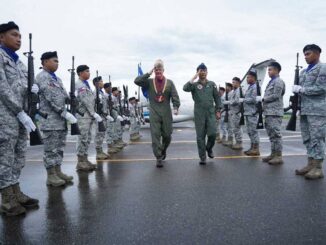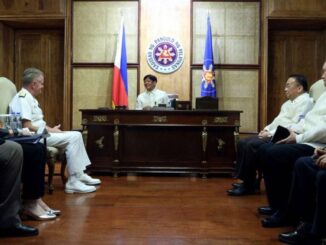
MANILA, Philippines — Self-styled experts and “think tanks” have been attempting to seed the narrative that the Philippines is the “next Ukraine in Asia” due to President Ferdinand Marcos Jr.’s pivot away from his predecessor’s pro-China stance toward upgrading ties with the United States, according to a new study on influence operations in the Philippines.
In its August 12 report titled “Nexus of Manipulation: Anatomy of Influence Operations in the Philippines,” media development nonprofit Internews described the narrative on the “Ukrainization” of the Philippines by the US as an example of a distorted narrative intended to disparage the latter.
The information campaign emerged after US Defense Secretary Lloyd Austin III visited the Philippines in February 2023, which led to a deal that gave US troops access to four more military bases in the Philippines. The two countries have a decades-old security alliance that includes a 2014 treaty known by the acronym EDCA.
This visit prompted self-styled geopolitical experts, think tanks, and dubious online entities that brand themselves as news sources to spread questionable narratives in 2023. In their commentaries, these actors drew parallels between the Philippines’ foreign policy stance and Russia’s invasion of Ukraine.
RELATED: What you need to know about influence operations
Distorting narratives
The narrative of the Philippines as the “next Ukraine” is one of several influence operations that spread in the Philippines from 2023 to 2024, based on the monitoring of Internews.
Besides Internews, a network of Philippine and global civil society and media organizations (including Philstar.com) also tracked a number of local and foreign influence operations that were seeded online in the same period. Most either dealt with the Philippines’ maritime tensions with China or the in-fighting between the Marcoses and the Dutertes, who teamed up in the 2022 elections.
The campaign to warn the public about the “Ukrainization” of the Philippines appeared to use one of five common tactics seen in influence operations, according to the report, which cited the “5D model.”
It specifically attempted to “distort” the narrative and twist the framing to cast the US — who has traded barbs with China over the disputed South China Sea — in a bad light.
Other tactics frequently used include dismissing allegations or denigrating sources, distracting audiences to shift blame, dismaying to threaten and frighten opponents, and dividing to generate conflict between communities and groups.
The distorting strategy involved the amplification of ideas across social media and columns, targeting supporters of both the Duterte and Marcos administrations. Some also mirrored official statements while promoting conspiracy theories.
Nonstate actors, including self-styled think tanks and so-called political analysts with unverified credentials, mainly helped to distribute the narrative.
For instance, on Feb. 7, 2023, YouTube channel “Global Talk News Radio” brought together talking heads from the “think tanks” Integrated Development Studies Institute and Asian Century Philippines Strategic Studies Institute to host an episode titled “PH: Project Ukraine in Asia.”
At the 1:29 mark, Herman Tiu Laurel, Asian Century president, said:
“Alam natin ang giyera masama sa buhay ng isang katauhan at ng Pilipino. Etong ilang araw na mga nakaraan mayroong pangyayari dito sa bayan natin na mukhang tinutulak ang mundo and ang bansa po natin sa kaguluhang ganyan din na nakikita natin sa Ukraine.”
(We know that war is detrimental to the lives of individuals and Filipinos. In recent days, there have been events in our country that seem to be pushing our nation and the world towards the same kind of chaos we see in Ukraine.)
Philstar.com, along with other media organizations, have previously flagged the Asian Century think tank as one of several entities that routinely amplify statements from Chinese state media on the two countries’ altercations in the West Philippine Sea.
Local distribution
Based on its monitoring, Internews also noted that local broadsheet Manila Times has lent its platform for the amplification of the “Philippines as the next Ukraine” narrative through its opinion columnists.
For instance, international relations expert Dan Steinbock argued in a Manila Times column on Feb. 6, 2023 that the Philippines’ strategic location in the region could parallel Ukraine’s role in European and Russian geopolitics. He argued that the Philippines’ as a “major non-NATO ally” and the expansion of military cooperation under EDCA is reminiscent of Ukraine’s increased military aid and strategic importance to the US.
Over a week later, writer Rigoberto Tiglao published a column in the same broadsheet with the title: “US intends PH to be its ‘Asian Ukraine.”
To maximize its spread on social media, the campaign also employed tactics like cross-posting and targeting of niche audiences to artificially boost its visibility and create an impression of widespread discussions.
Connection to Philippines-China maritime tensions
Who stands to gain from this narrative?
The study said that the narrative deepened the polarization of beliefs regarding the Philippines’ altercations with China in the South China Sea, parts of which it refers to as the West Philippine Sea, as well as the collapse of the Marcos-Duterte political alliance.
The narrative “legitimizes China’s maritime claims and positions by inviting think tank positions such as the South China Sea Probing Initiative,” the report said.
It also “erodes trust in legitimate media outlets, journalists, and subject matter experts on maritime law, including attacks against factcheckers (VERA Files and PressOnePH) and Coast Guard
spokesperson Jay Tarriela.”
What’s next?
In its report, Internews outlined a detailed strategy to effectively combat information operations in the Philippines, which involves more than just the use of fact-checking tools.
“This involves investing in social media monitoring tools, fact-checking platforms, open-source intelligence (OSINT), and investigative journalism to monitor and detect these operations,” the study said.
“Developing defensive communication strategies is essential for disseminating accurate information and preempting IOs. Public awareness and media literacy programs are crucial for equipping citizens with the critical thinking skills needed to identify and resist IO narratives,” it added.





Be the first to comment